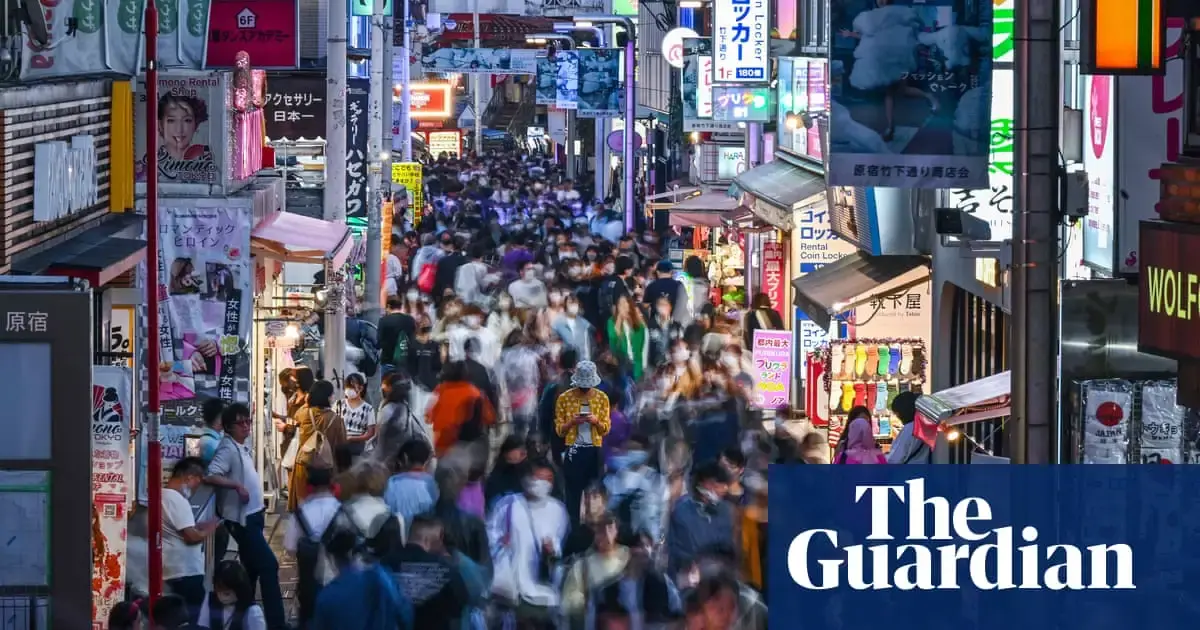I was watching a documentary about this. White guy who’s been living in Japan for decades goes to dying villages, talks with the locals in Japanese, they complain about no one wanting to live in villages, declining house prices, no one to do the necessary jobs. He mentions it’d be nice to live in a village.
The look of fear. You wouldn’t understand the culture, we have a certain way of doing things, … yadayada.
Wasn’t that a BBC article? The wording is very familiar as well the exact scenario.
Do you have a link or name to that docu?
Sorry, no. Think it was something on NHK I watched several years ago.
Wouldn’t have thought that NHL of all would portrait japanese people like that. Interesting.
Funfact: Increasing birth rates in industrialized countries is correlated with increasing wealth of people in the age range 18-45 and increasing financial equality.
But that means less billionaires.
Makes a lot of sense anecdotally. So, I’m in my late 20s, making what people say is a “pretty good salary but not the highest I’ve seen” for someone my age, I save up religiously, and I have made zero large purchases (including holidays abroad) for the past 3 years.
I can now just barely afford to buy a decent place to live in.
That’s all without children. Now how in the hell am I supposed to afford that with a kid too? They’re very expensive.
In my early 30s - spent my 20s saving, only went on holidays twice in the past 10 years (and one of those times was a trip to Japan - ironic), and am considered a high earner in my field.
…the idea of buying a nice house that I enjoy, in an area that isn’t depressing, is so far off it’s almost a joke.
Kids? The very idea seems laughable to me.
I’m convinced this is a major great filter event for all intelligent species. “Can the natural consolidation of power and resources in the world be sufficiently counteracted to avoid massive cataclysmic population crashes?”
Civilizations collapse because of environmental overshoot. Every other civilization has been in relatively small geographic locations.
Whoever thought this globalization thing was a good idea was incredibly short sighted.We have the technology to overcome these hurdles. Just no politician wants to dictate that we do, because no business leaders will have it.
Do we?
Setting aside the issue of people who would refuse to go vegetarian, getting everyone on the same page politically, etc, we’re at the brink of environmental collapse (at least the food-chain is) and the IPCC models of keeping warming under 2°C rely on wildly optimistic predictions about our future carbon capture abilities with basically no basis in our present reality.
And that’s not even getting into how hopeless our ability to mine enough minerals to replace all current electrical demand with renewables. We’re talking trillions of dollars, the biggest project in human history. And that doesn’t account for how our electricity usage grows year over year.
On top of all that, the plankton in the oceans are dying off right now due to acidification. Without plankton, the oceanic food chain collapses. Without the ocean we’re all fucked, oceanic life is most life on earth.
The best case scenarios here involve billions of deaths.
You’re only proving the truth of what I said.
I may have misunderstood what you meant to say, in that case.
Was I wrong in thinking you were saying that we could avoid mass death/collapse? Because mass death seems inevitable even if we all got our shit together, that was what I meant with my last comment.
Were you saying “humanity can survive despite billions of deaths because we have the technology”?
I guess in that case we do agree.
It’s probably a good thing in the long run. Like how the plague in Europe actually gave the serfs more rights. Since it gave the workers more leverage since there was more demand for workers than they were in supply.
Japan is overcrowded. Sure villages are bleeding dry, but in the cities people live in tiny apartments that cost too much. And lots of people do very meaningless soul crushing jobs for little pay, jobs that are already automated in the rest of the world. Like even a job that can be replaced by a simple sign. Seriously when I was in Japan I saw people at the station that were just pointing passengers towards the exit. And it wasn’t even an emergency situation, just a regular workday.
Sure a shrinking population is bad for the economy, but for the people it will mean that housing prices will go down and pay will go up and they will have more rights in the long run.
people at the station that were just pointing passengers towards the exit
This is actually one of the things I really like about Japan. It’s so easy to miss a sign, or not be sure if this is the sign you should be following in your situation, or otherwise get confused in train stations, airports, etc… Having an actual person there showing that yes, this is where you should be going, and even help you with questions if necessary, makes things that much simpler and more comfortable.
That’s true, and Japan does have a workers shortage, but unfortunately they are planning on meeting that worker shortage by building robots.
In fact they have already deployed robots in places like airports and restaurants. You can occasionally see them depending on where you go.
One thing I would like to refute however is that housing costs in Japan are quite low compared to the United States. You can buy a house in Tokyo for less than you can buy a one-bedroom apartment in New York or the Bay area. Houses in the countryside are way cheaper.
There are literally millions of vacant houses in Japan right now that are being maintained by family members or neighbors. They are literally boarded up and you can buy them for pennies. I was just in Japan a month ago and in one town near Tokyo, over 50% of the houses were vacant.
But pay is not the same as in the US. Average wage in the US is 77k in Japan it’s 41k. Wages have been even more stagnant in Japan than in the US. Also Japan is in a unique situation. Nobody wants to live in an old home unless they have no choice, because Japan is an earthquake prone country. People only want to live in a home that’s build up to the latest building code. Otherwise people wouldn’t choose to live in tiny apartments. People rather live in a small new apartment than a larger old one, because they fear the old building is a death trap. Therefore rent and prices for relatively new homes are still high. And that’s also why, unlike the rest of the world, houses depreciate in value. And because houses depreciate they are maintained poorly. If you buy such a cheap house you need to raze it to the ground anyway and rebuild from the ground up, because the building is falling apart. Yes cheaper than in the US but you will most certainly lose a significant amount of money when you sell the home again. They are not investments in Japan.
Re: that last sentence – housing should never have become an investment in the first place.
I mean, increased worker productivity is good for maintaining quality of life and economic growth when the population shrinks. Other countries should adopt more robots.
Japan’s underworld has not escaped unscathed either: a majority of yakuza are over 50 and there are now more gangsters in their 70s than in their 20s. Meanwhile, senior porn is a growing niche, populated by a handful of silver stars in their 60s, 70s and even 80s.
Do older people watch porn with older performers? I was under the impression that younger people are the object of gaze regardless of age.
the older i get the more i like mum tums
Soldier Boy approves
I think people like watching things they can relate to / fantasize about doing.
So i would think old people would enjoy watching old people, at least some of the time. Kinda like 30 something moms who are really into dad bods. Or all the milf porn some middle aged dudes like.
I’m going to make a few assumptions here, but my thought is that women in porn largely look like they’re between the ages of 18 and 30. Men on the other hand look like they’re 30-45 even when they’re ‘acting’ like they’re a lot younger.
Guys in porn are usually quiet and the focus is on the woman because we’re supposed to be able to imagine ourselves as the guy. Kind of like the master chief. You aren’t supposed to see his face because you are him.These Japanese guys want bodies that resemble theirs more, so they can think of themselves in those positions easier.
Obviously you run into a lot of other issues with a sudden change but we are frankly pretty overpopulated and could use a decrease. It turns out that a system predicated on infinite population growth with finite resources can’t be sustained forever. Especially with how finite they are in our case.
I think even worse than our population issues is the overcentralization though. SO much is based around Tokyo, the vast majority of jobs are located there, especially if you want any upwards mobility. It’s even worse if you include areas like Chiba and Saitama as part of the greater Tokyo area. Even the other cities pale in comparison to opportunities in Tokyo. If people could spread out a bit more, it wouldn’t be nearly as bad as it is now.
I was lucky enough to be able to move out of Tokyo last year thanks to my work. I am not in a super rural area but I definitely never want to go back to Tokyo if I can help it. I am in the mountains around Mt. Fuji, and get to work overlooking a spectacular view of the mountain. Don’t have to deal with packing into crowded trains in the summer when everyone is dripping with sweat.
deleted by creator
It’s more efficient, thus, more profitable.
Latency vs throughput vs reliability. 1 and 2 - maybe. 3 - nah.
I can help with that, if you like tips fedora /s










